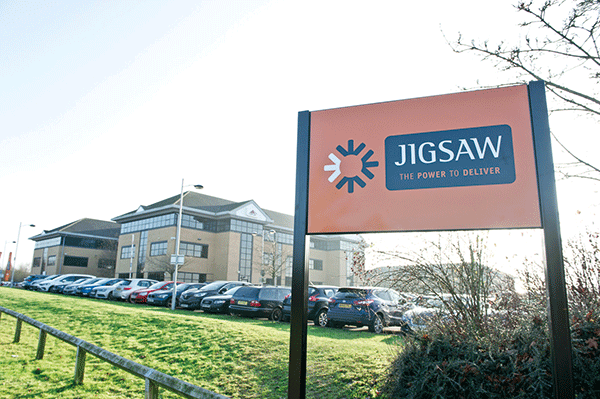
Is it a 3PL? Is it a 4PL? No it’s a 3.5PL. Steve Hobson talks to national consortium Jigsaw about its alternative haulier partner model.
Jigsaw is a consortium of 11 regional, mainly family- owned hauliers that operates as a national network for customers that need a UK and Ireland-wide ser vice but for whom the large 3PLs are not a natural cultural fit.
Owned by its largest partner CM Downton, Jigsaw employs 70 staff and this year is expected to report a turnover £37.9m, up 10% on 2016, and deliver 295,000 consignments.
Customers include Premier Foods, AB InBev, Indesit, Mars, Ardagh Glass and Whirlpool and partners are Pollock, Elddis, Currie European, Montgomery, Longs of Leeds, PC Howard, Bartrums, Sparks Transport, S&R Smith and Nolan Transport.
So why do clients prefer Jigsaw to one of the national 3PLs? MD Andy Humpherson says: “Transport is a cyclical business that swings from small regional hauliers to large corporations and we are in the cycle now where we are coming back to more localisation. However, a lot of manufacturers have taken out their skills base and where they used to have logistics teams, a lot of that knowledge base is gone. To leverage the benefits of regional hauliers they’ve got to have something as a single source and the knowledge to pull them together.
“That’s the void Jigsaw is filling. There is clearly a demand for the good things that regional hauliers can bring to the party, which is not evident with the large guys. It is a different way of approaching life and they make things happen. That’s very powerful. If you can harness that and put it in front of a large corporation and talk the same language that’s the success Jigsaw is bringing. It can translate the requirement from the large corporation into the haulier.”
Set of services
As the large 3PLs have expanded, they often struggle to present a coherent set of services to customers, which can find themselves dealing with different departments in the same firm. “A lot of the large corporate 3PLs operate in silos so it’s not one organisation,” says Humpherson. “Often you will get a contract solution designed from other parts of the operation and those barriers can be significant. Whereas collaboration is our business model. We know how to make things happen and don’t have to go through long approvals. It is much easier and quicker to get things done.”
The proof of the service pudding is in the length of time Jigsaw has retained some of its key clients.
“Service levels offered by the 3PLs are of a certain standard. However, our customers, which are mainly large FMCG manufacturers, were on fourth or fifth contract renewals with those guys,” says Humpherson. “For example, we’ve had Mars since 2003, Premier Foods since 2005, and our success rate in renewing is very good. That symbolises our service offering.
“At Jigsaw we are not encumbered by asset productivity; the hauliers are. We are focused on delivering service to the customer. It’s a subtle but important difference. If you try to do that wrapped up in one organisation it is easy to lose sight of what you are selling to the customer because you are constantly looking at return on investment.”
Agent work
Humpherson is, however, quick to point out that Jigsaw is not a 4PL, managing regional hauliers as an agent of the client. But he concedes that is now an expanding part of the business alongside the core member-only Jigsaw operation.
“We have been described as a 3.5PL but we are also a 4PL,” he says. “Increasingly our business is concentrating on 4PL-type provision. That means we don’t just provide trucks – we manage hauliers that might have had contractual arrangements directly with the customer such as an Irish specialist or some form of backhaul arrangement.
“We offer a lot of our customers an added value service: we manage their backhaul operation for them. So if they have a contract with Tesco to backhaul, rather than the customer having a resource to manage that, it comes into us and we manage it for them.”
Subcontractors
While 82% of Jigsaw’s total volume still goes through its 11 partners, increasing volumes will go through specialist nonmember subcontractors. “As we expand, the requirements become more diverse,” says Humpherson. “In the early days the founding partners would have run trucks all over the country. Where we are now with rates and productivity they can’t do that and the members stay within their geographic areas.
"So if we pick up a client with a heavy requirement to say Cornwall then Downton would take an element of that volume. But we would then work with a specialist in that geography. The same would apply in the Highlands.”
But Humpherson is adamant that Jigsaw will never own any assets. “We’re owned 100% by Downton, so we would never get into a situation where we are running fixed resource,” he says. “As soon as we do that we start making decisions for the wrong reasons. Downton is the muscle behind us, so if any client is concerned about what happens when the going gets tough we have that resource behind us.
“All the partners are contracted to us so all our service level agreements with our customers are reflected back in their contracts. They all sign undertakings to take on allocations so any volumes going into the North East and the Midlands Elddis would be signed up to take and one of the other partners would provide support if the volumes got too big.”

This enables Jigsaw to cope with large swings in volume that can result when retailers drop unplanned promotions on the supply chain. “The dream is to have planned traffic every day that you can pre-allocate resource to and every business has a core level where that happens,” says Humpherson. “For us the access we have to partners’ fleets is a big resource and our real specialism is how we cope with spikes.
“Every customer has planned and unplanned promotions. We do a lot of work with the customer base putting plans together for peak periods. For our alcohol clients we have meetings in August to identify the Christmas peaks and allocate resource.
“When you have unplanned spikes, we usually start to see a couple of days before that something is coming. Our commercial team is heavily ingrained in customers’ operations and they usually bring information back. We are not afraid to tell a customer that if they do something, they are going to fall over. It could be an unreasonable demand such as a 500% increase that has to be delivered in a two-hour window. If you are in the right place in the relationship, you can have those conversations.”
Coping with unexpected spikes in demand is getting harder because years of low rates and rising costs have pushed many small fleets and owner drivers out of the market. “The whole haulage population has dropped away,” says Humpherson. “There are increasing numbers of ageing owners and when they do hang up their boots, who will take it on? There is a reduction but when that starts to happen opportunities start to present themselves and you find the cycle will come round.
“You have to treat hauliers properly. A lot of 3PLs will have a difficult relationship and you can’t work like that. You have to be easy to trade with in terms of IT systems and relationships.”
Happy
Despite losing two members recently, Widdowson and Bird’s, Humpherson says he has enough to meet demand. “We are happy with where we are now; we’re happy with what we’ve got,” he says. “If we land one of the projects we have on the cards at the moment, the geographies of that will demand
another partner to help us in that area.
“The haulage market has been consolidating for several years and we’ve seen the situation with Widdowson, Davis Haulage and now Bird’s. There is a lot going on that is constantly changing the landscape. We would never say we don’t want anyone coming to us, but it has to be the right type of haulier. They have to have the right standards and we need them to bring local expertise.”
Jigsaw is different from a pallet network both in its distribution model and the type of freight it carries.
“Jigsaw will take full or part loads and move them through our own partner network so it won’t go through a central hub,” says Humpherson. “We have a different service offering – 95% of our deliveries are timed; pallet networks charge you £15 for a timed delivery whereas it’s a core part of our business.
“We try and do as much direct collection and delivery as we can. But in today’s marketplace where lead times and consignment size are reducing for our small loads, we will trunk into our partners’ platforms. Smiths in Purfleet for example is our London specialist, so it will collect from some of our contracts and other contracts will trunk in. That will be cross docked as part of its normal operations and delivered on its radial vehicles.”
IT development
Humpherson says the slow pace of IT development in haulage is a big disappointment and Jigsaw has led the way with a significant IT investment. “There are three key areas to our business: people; IT systems; and hauliers,” he says. “We transitioned to a new platform in June last year with US company BluJay Solutions. We have spent the best part of four years getting to where we are now. Planning freight is a given for Jigsaw clients and as with any transport management system [TMS] worth its salt, you can throw some orders in and it will autoplan.
“The key thing is our front-end interaction with customers and our interaction with hauliers. The more we can get that to happen seamlessly, the more chance we have of a small job becoming very successful. If you have to start making phone calls or sending emails the potential for error is enormous. So in the spec for the IT platform the messaging and attention to detail was really important for me.
“I want to be able to go to a major client and when they say ‘we are using SAP and we want you to integrate’ we can say ‘yes we can do it within three weeks’. A lot of the 3PLs have enormous IT teams and they can take up to six months to get the project up and running. Our hauliers log into a portal where they can download the orders into their own system and upload information. As soon as we allocate the job to them they can see all the information they need and the rate they are going to get paid. It works very well.”
While most of Jigsaw’s members’ vehicles have tracking on their vehicles Humpherson says that is no longer enough. “We need to integrate tracking and TMS because tracking is useless to me unless I know what’s on that vehicle,” he says. “It’s coming but when you look at the parcel industry we’re a million miles behind.”














